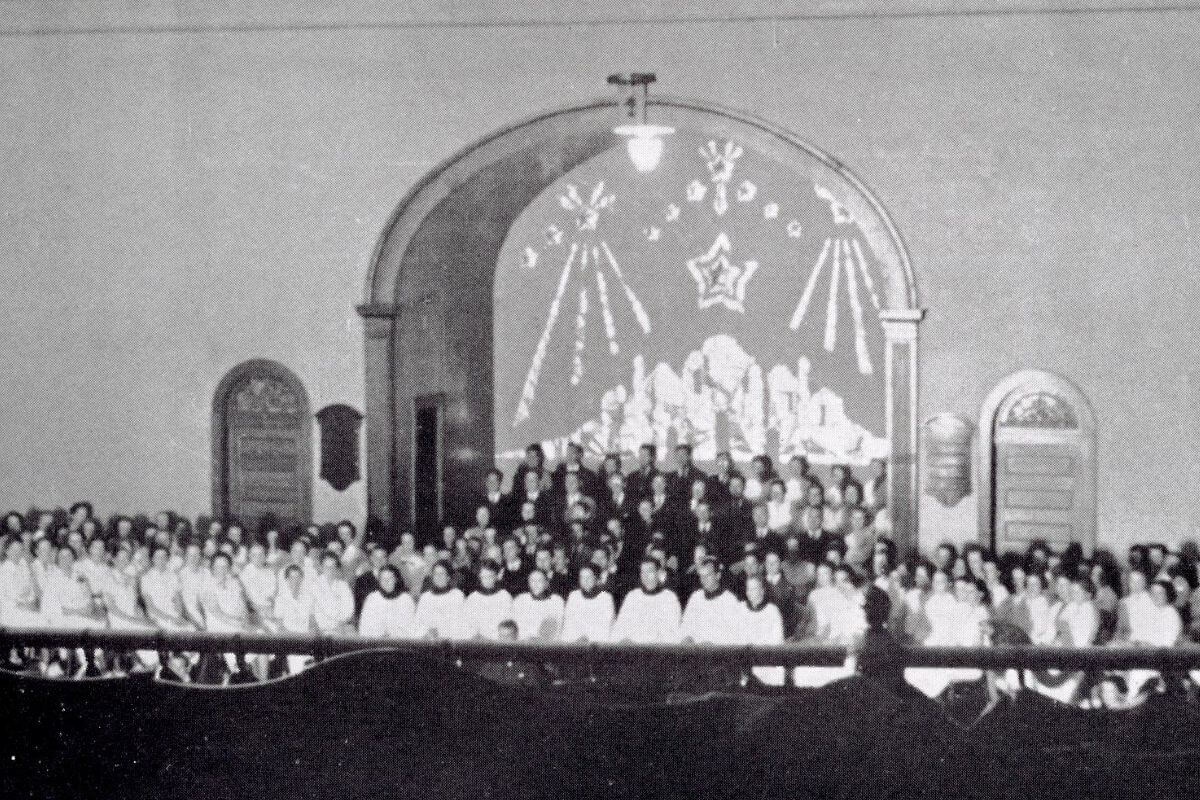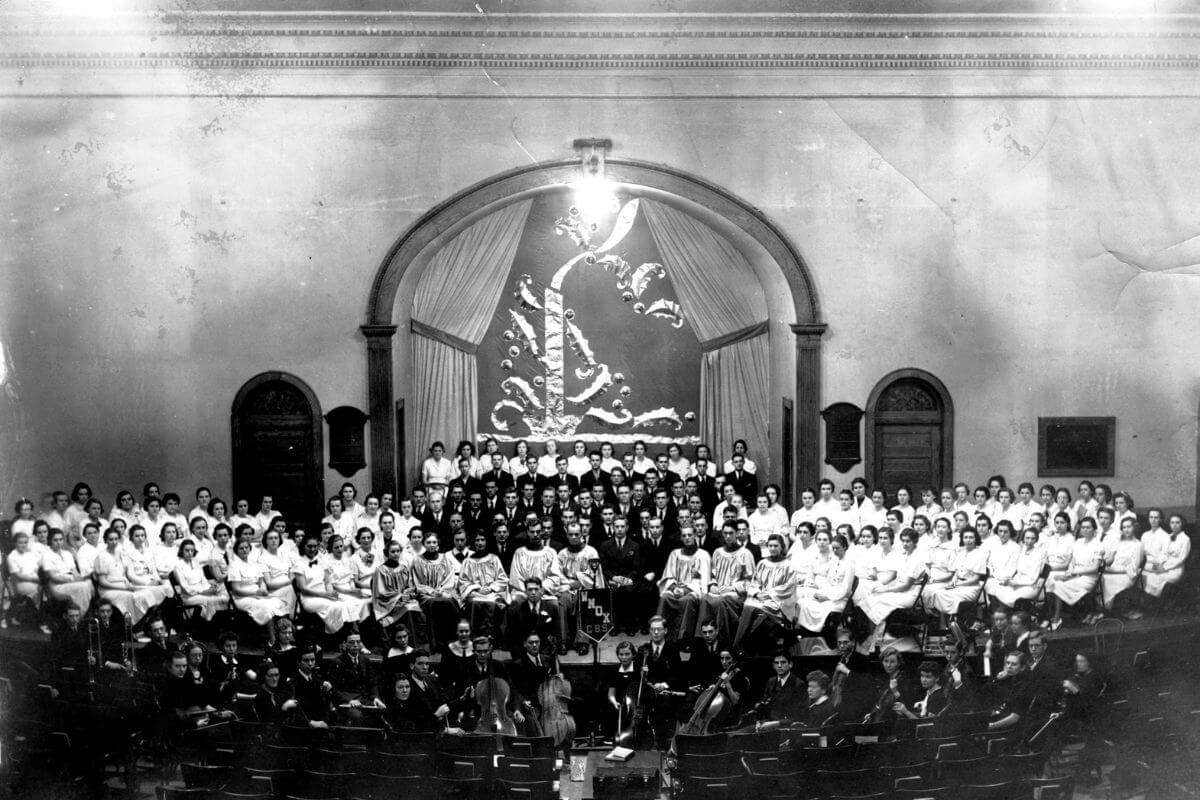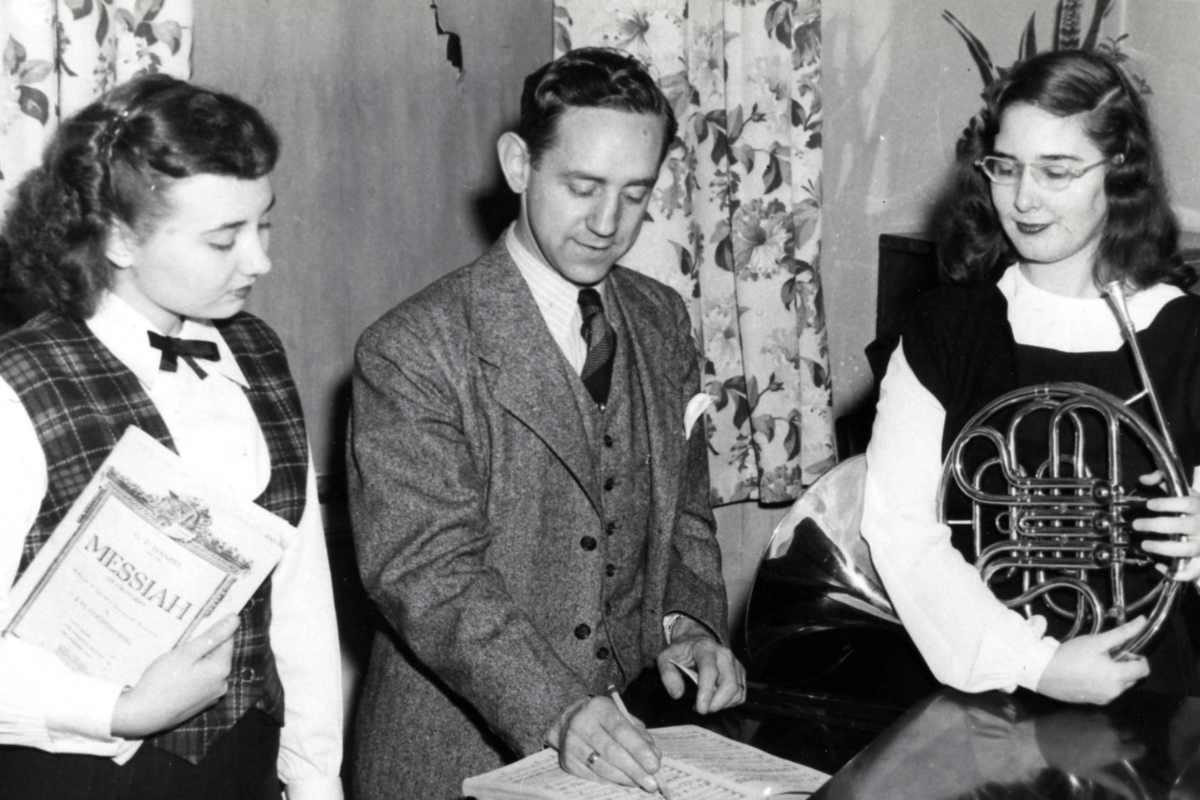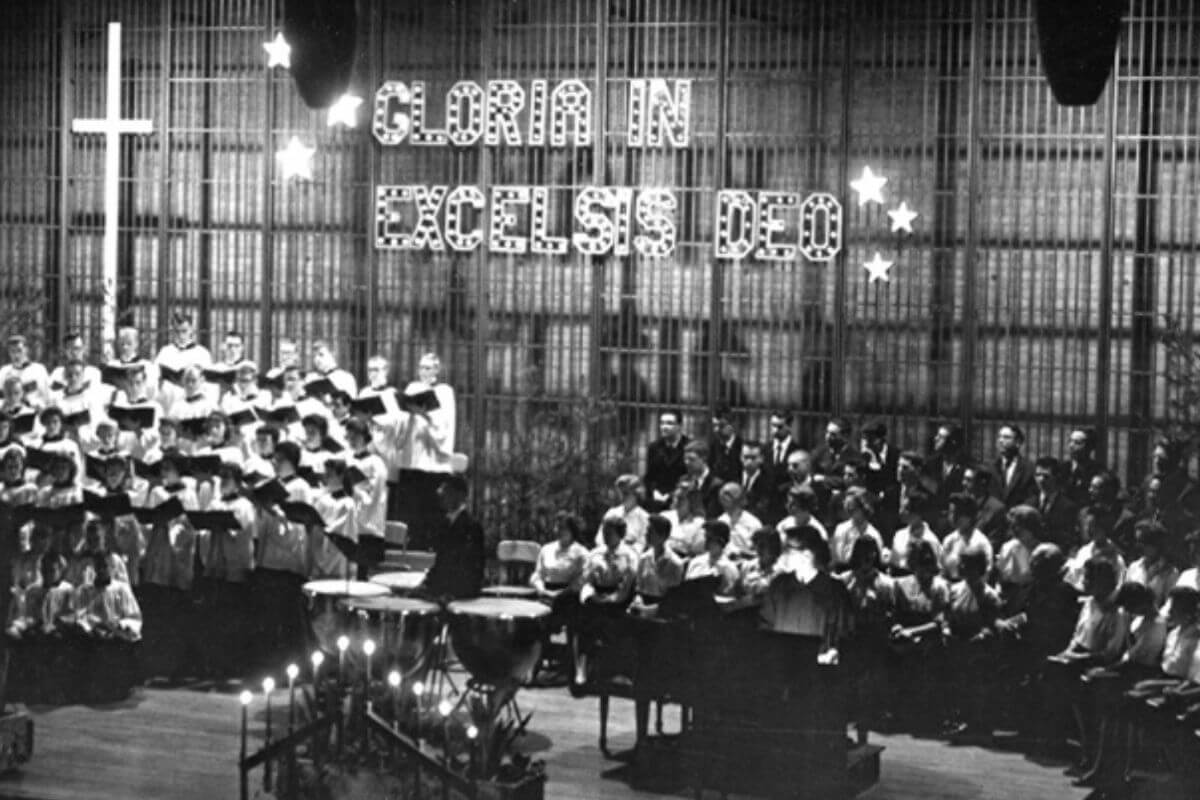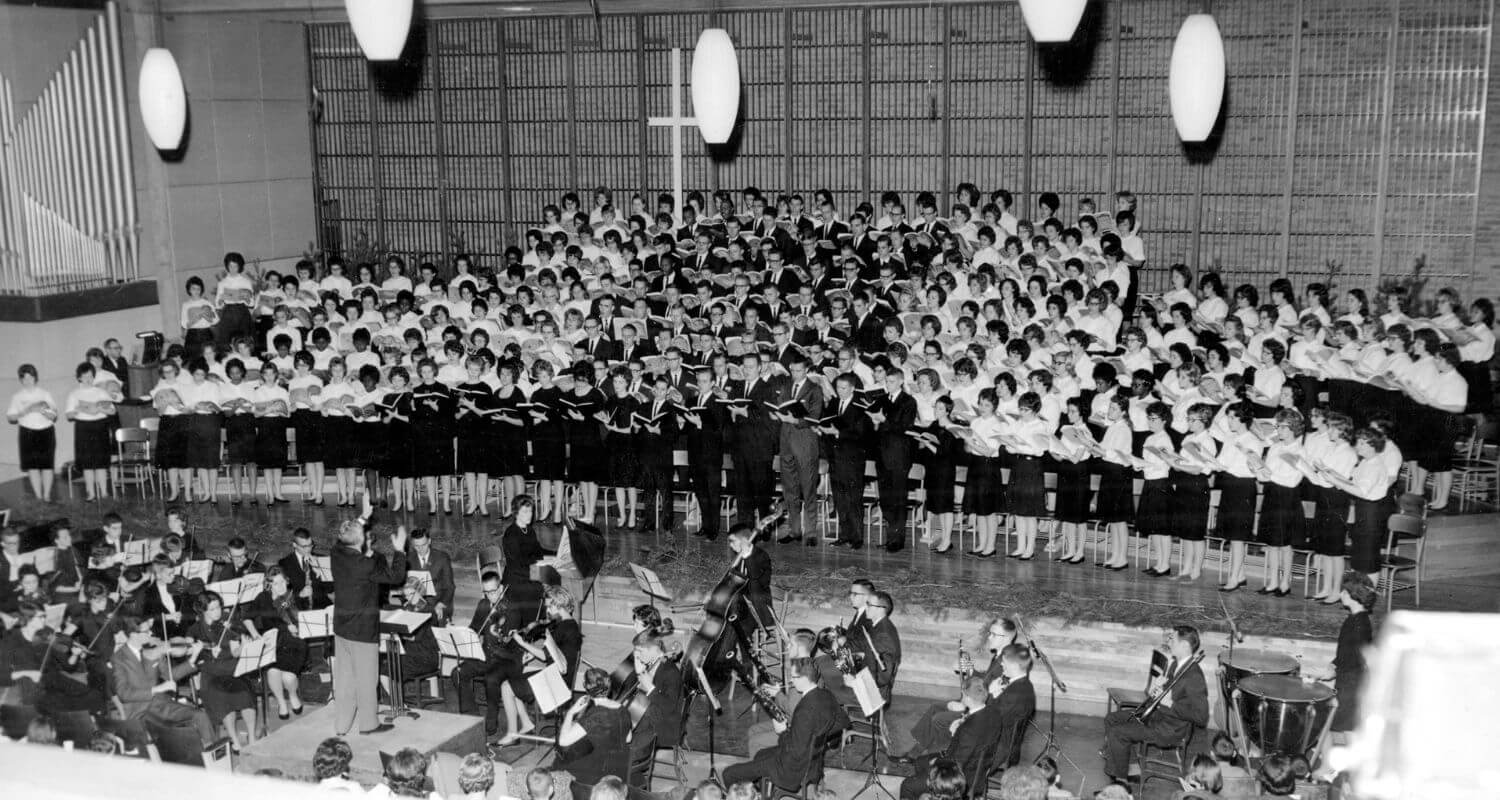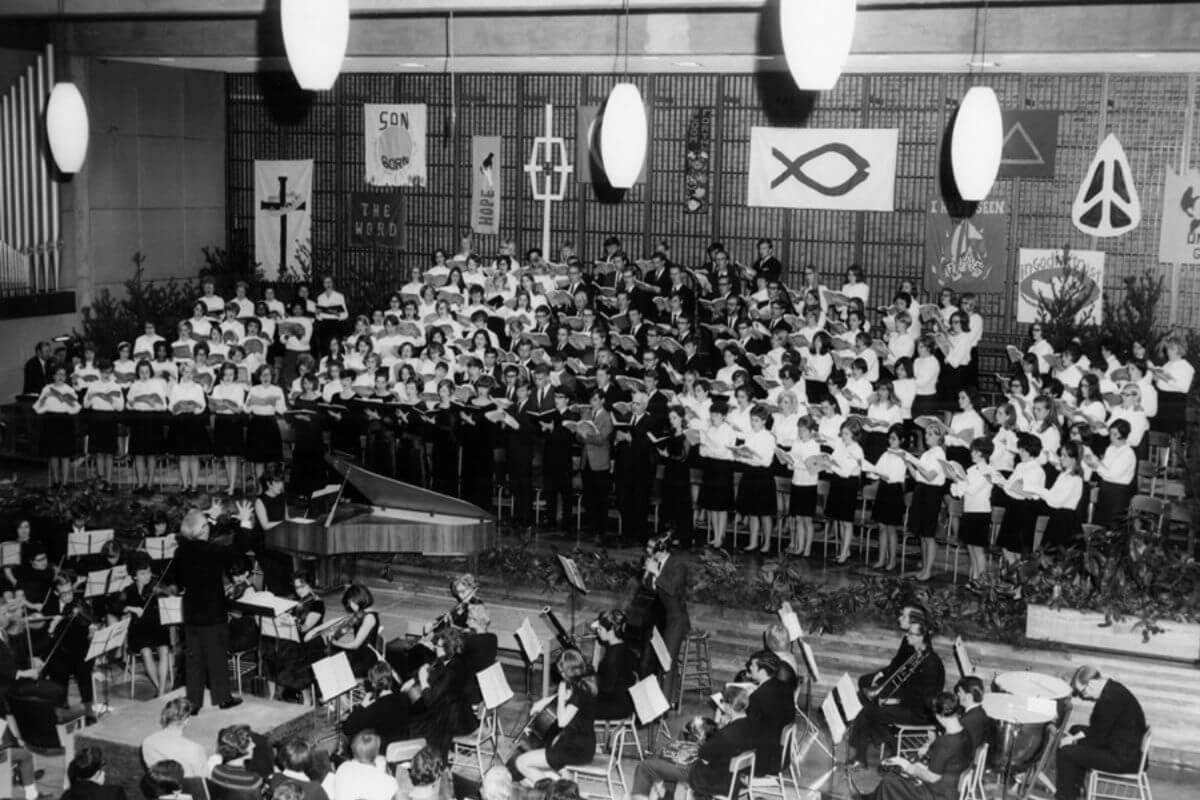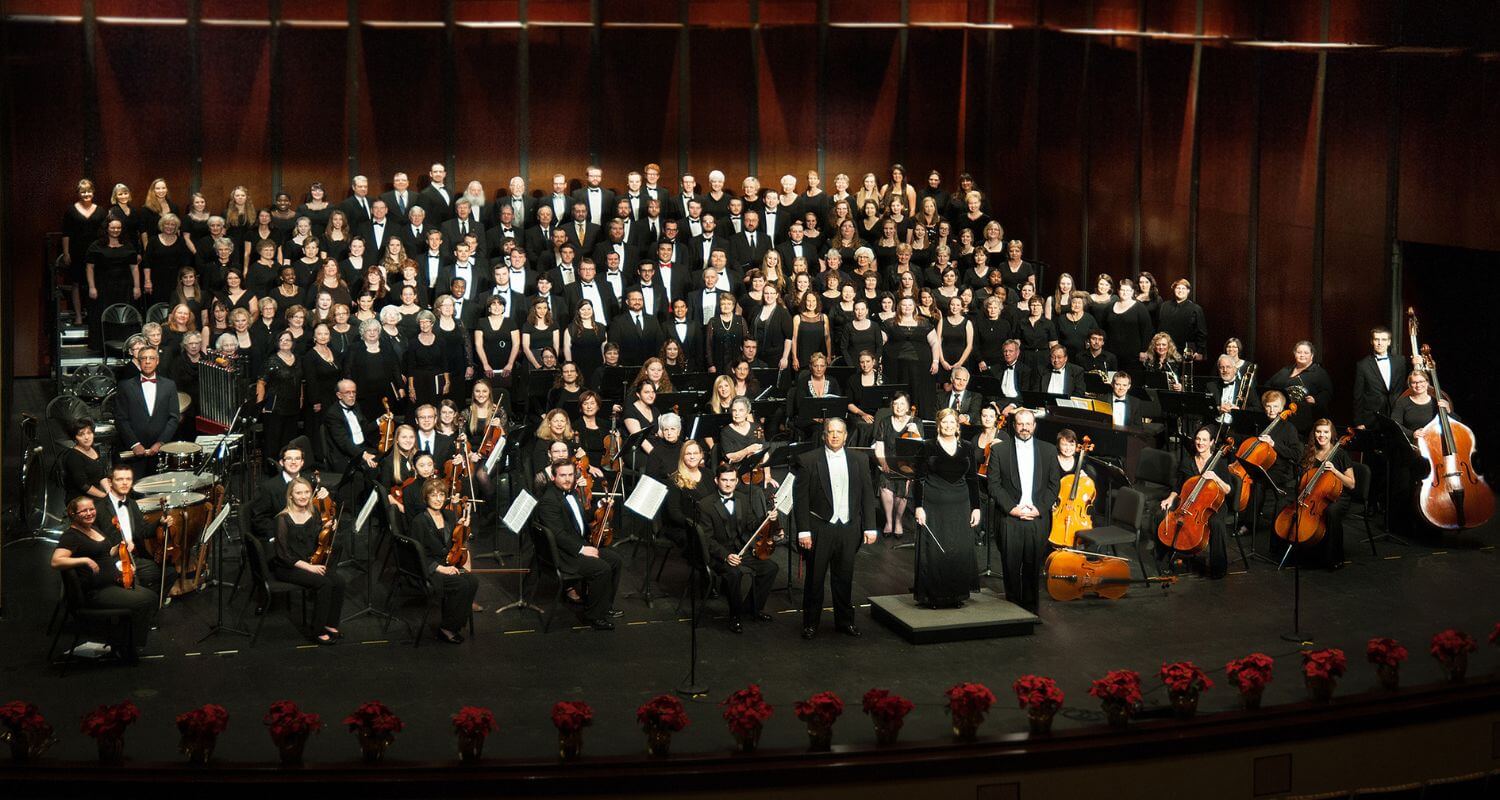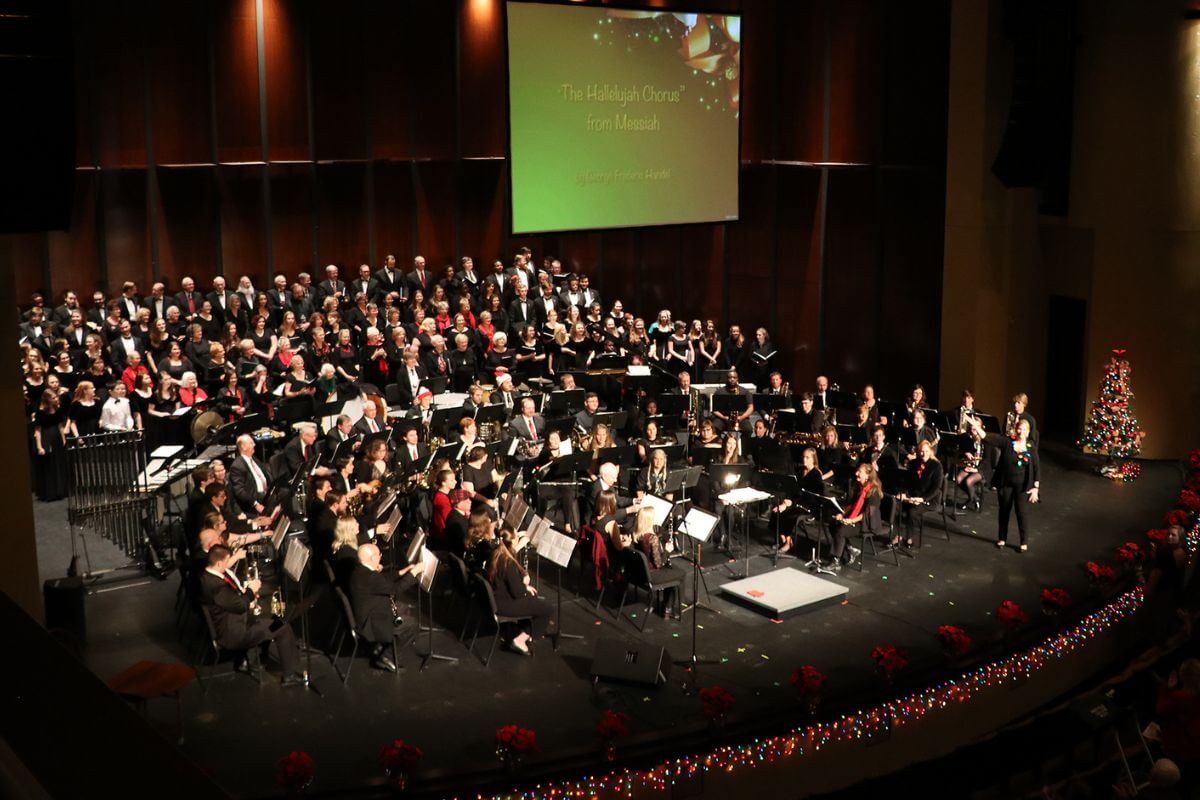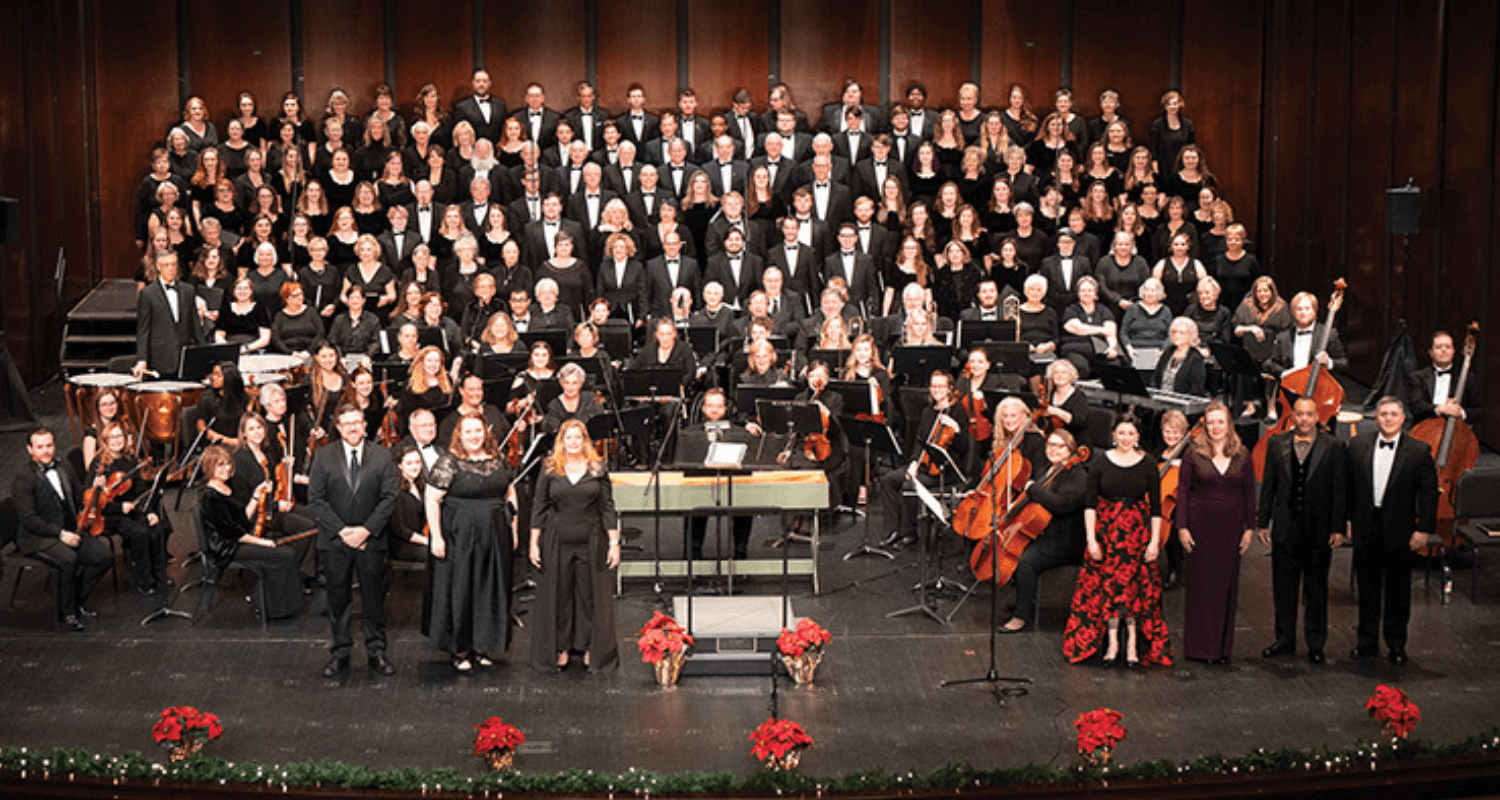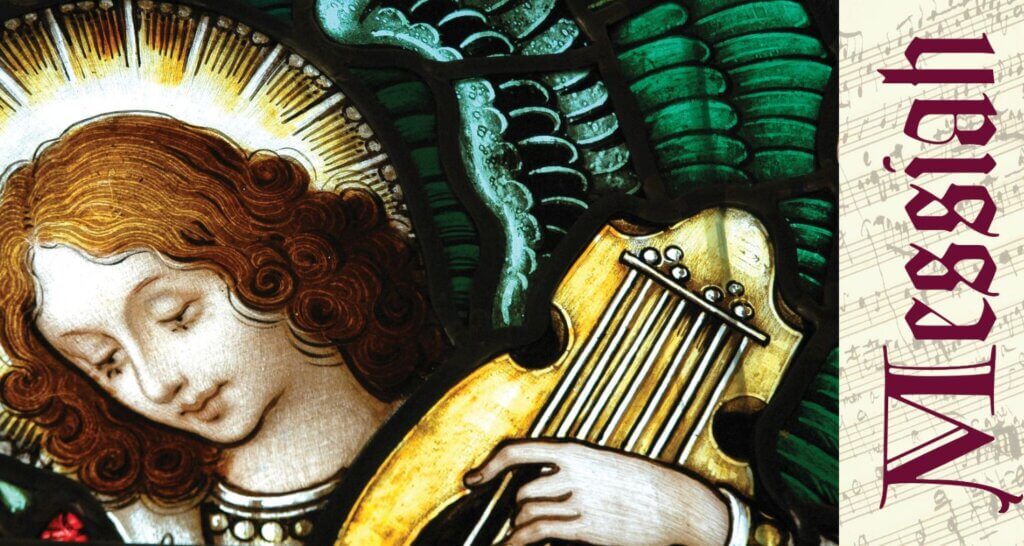
‘Messiah’ at Maryville College: College, community ensembles come together to celebrate an MC tradition dating back 91 years
Aug. 22, 2023
You can hear it in their voices and see it in their eyes when they recall the performances of yesteryear, the veteran singers of the Maryville College production of George Handel’s “Messiah,” who remember every detail like it happened yesterday.
Students pitching in to decorate the long-gone Voorhees Chapel, lost to fire in 1947, with enormous holiday wreaths. Almost 300 singers crowding onto the stage at the old Wilson Chapel, demolished to make way for the Clayton Center for the Arts, and crowds so large that members occupied all 1,200 seats and extra chairs set up outside of it. Post-“Messiah” holiday wrap parties that took place afterward, at the homes of choir directors and musicians throughout the adjacent College Hill neighborhood.
“Messiah,” they remember, wasn’t just tradition. It was an event, a way to bring together members of the community with students, professional musicians and church singers, devoted alumni and those who never attended MC. It signaled the arrival of the holiday season, held for years on the Friday after Thanksgiving, and was so grand in scope and opulence that radio stations in Knoxville once broadcast recordings of it across the Tennessee Valley.
It was a touchstone of so many lives … and it can be again, if the organizers of this year’s “Messiah” performance — scheduled for Dec. 5 at the Clayton Center — have anything to do with it. Rehearsals begin later this month for two organizations that will be integral parts of the oratorio — the Orchestra at Maryville College (OMC) and the Maryville College Community Chorus (MCCC), which will be joined by the students of the Maryville College Concert Choir and the Heritage High School Singers — and the conductors of both organizations want to reach deep in the local community to recruit singers and players who feel an attachment to “Messiah,” to Maryville College, and to the spiritual warmth and vibrancy that performing it nurtures among those on stage and in the audience.
“I see this performance, and the fact that so many College and community forces are coming together for it, as a sort of rising from the ashes of COVID,” said Dr. Ace Edewards, conductor of the orchestra. “It is an opportunity to come together, renew social bonds, and be part of something grander than ourselves.”
“I’m really excited about this year’s performance, because in part it is the first time the College has done it since the grand bicentennial performance (in 2019),” added Dr. Dwight Dockery ’05, conductor of the community chorus. “Additionally, by getting to perform such a work with community members, alumni, MC students and high school students, we will really have the opportunity to see the broad relevance and appeal of this monumental work.
“There will be folks from ages 18 to 80 or so singing this piece that is nearing 300 years old. How many other activities can boast such a thing? To me, this is why we make music — to be part of something greater than any of us but made great by all of us.”
A choral tradition is born
The tradition of “Messiah” itself dates back several hundred years: It was first performed in 1742, and since the death of Handel in 1759, it’s become customary to perform it during the holiday season. Like Maryville College under founder Rev. Isaac Anderson, it would take a few years until it found its stride, according to Stacey Wilner, director of choral activities and the MC Concert Choir.
“Handel’s first performance for ‘Messiah’ was a fundraiser for an orphanage in Dublin, Ireland. That was followed by a lackluster reception in London, although the work had a resurgence of popularity in 1750 at a charitable performance for a local Foundling Hospital,” Wilner said. “Both of these earliest performances were community service-oriented events, which ties in so nicely with the mission of the College. George Frederick Handel and Isaac Anderson seem to have a similar philosophical ideal and a desire to help the less fortunate.”
The three parts address specific events in the life of Christ as told in 53 movements, with the libretto (by Charles Jennens) drawn primarily from the Bible. Part I, traditionally known as the “Christmas part,” will be performed by the four ensembles, including the student guest performers from Heritage High School.
“This is just an amazing experience for our students to be able to perform at the college level. When you add in that this is one of the greatest works that has been written and a memory they can keep with them their entire life — it’s just phenomenal,” said Tyler Owens, the choral instructor at Heritage, located a few minutes up East Lamar Alexander Parkway from MC. “It’s also such a meaningful experience for us, because we have many former Heritage Singers who are currently in the choirs at Maryville College. To be able to see these connections and growth over the years is just really special for me as a director.”
While Part I focuses on the Christmas story (the performance, Wilner added, will also include the popular “Hallelujah” chorus that closes Part II), there was a time in years past when ensembles at MC performed all three parts, and attendees soaked up every note. Gail Hafner ’60 remembers it well.
“I started singing when I was in high school with the College, and back then we did the whole thing, or almost the whole thing,” she said. “It wasn’t Christmas until it happened, and it was huge in the community, with people packing into Wilson Chapel and down the hallways and out into the lobby. And we did it every year, the whole thing — and people didn’t mind! They’d stay three hours for ‘Messiah,’ then stay afterward to sing Christmas carols!”
The origins of the performance of “Messiah” on the Maryville College campus can be traced back to Frances Henry, one of the college’s music instructors who taught on a non-credit basis before the formation of the College’s Fine Arts Department.
The year was 1932, and Henry’s “Oratorical Society” of almost 100 singers from the town and the college performed “Messiah” for the first time. Over the years, the evolution of the Fine Arts Department boosted the holiday production dramatically. In 1936, choir, band and orchestra teacher Ralph Colbert organized the first 30-piece orchestra to accompany the “Messiah” chorus.
Several years later, in 1941, WROL-AM in Knoxville recorded the performance and aired an hour-long program of excerpts for its listeners. That was the year, according to MC Archivist Amy Lundell ’06, that the bombing of Pearl Harbor took place on the day of the annual event’s dress rehearsal. Originally scheduled for the next day, it was delayed due to President Franklin D. Roosevelt’s “Day of Infamy” speech, which was broadcast to the nation. The next day, Colbert directed “Messiah,” but at some point during the evening, he went off-script.
“When the concert took place, he spontaneously turned around and directed the choir, the orchestra in both ‘God Bless America’ and ‘The Star-Spangled Banner,’” Lundell said.
The baton he used for that concert is now known as the “Pearl Harbor Baton,” and it currently resides as one of the numerous keepsakes in the MC Archives, a link to a time when the Maryville community found comfort in both the music of “Messiah” and the spontaneous resolve displayed during one of the nation’s darkest times.
The height of ‘Messiah’ splendor
Although fire destroyed Voorhees Chapel in 1947, “Messiah” at Maryville College did not pause. For the next seven years, all of the College’s plays and concerts, including “Messiah,” took place in the old Alumni Gymnasium. It was also in 1947 that Dr. Harry Harter began his 35-year career as choir director and vocal instructor at the College, and his tenure saw “Messiah” swell in both opulence and splendor.
“It was Harry’s thing, and he brought it to great fruition,” said Dr. Robert Bonham, MC music professor emeritus and adjunct instructor of piano. “The big deal of the year was ‘Messiah,’ and rehearsals began soon after the semester started. I was basically the rehearsal pianist, and even though the performance suggested that the instrumentation was sparse in contrast to the voices, Harry had a different concept, and the way he conceived of things was the bathtub-and-the-kitchen-sink approach that involved everyone. And the advantage of that was that it became a community event that brought everyone together.”
When the new Samuel Tyndale Wilson Chapel was completed in 1954, “Messiah” became one of the biggest holiday traditions in Blount County and beyond. In the 1960s, close to 300 singers would crowd onto the chapel’s stage, and the audience size was staggering — participants back then remember organizers having to set up extra chairs outside the chapel. For Margie Ribble ’61, who came to Maryville College as a first-year student in 1957, the opportunity to play such a sacred piece of music became such a part of her life that even today, after retiring as a member of the Orchestra last year, the thought of not being a part of it this holiday season is rather heartbreaking.
“Being a part of ‘Messiah’ was the best, and I loved playing it,” she said. “It’s just my favorite thing to play because it’s challenging but not impossible.”
As another first-year student, Tom Taylor ’70 — who would go on to serve as the mayor of Maryville from 2008 to 2020 — found himself caught up in the “Messiah” fervor when he arrived on campus in the late 1960s. It didn’t take long, he said, to understand just how big of a deal the annual production was among his peers and in the community.
“It was a massive event, and I didn’t realize it at the time, but suddenly there was this buzz all over campus, and everybody was talking about who the soloists would be,” Taylor said. “Some of my friends were going, so I tagged along, and I was just blown away. I saw it when I was in high school, but I had forgotten how magnificent it really was, and I was really amazed at the level of excellence. I remember hearing the overture and thinking how sweet it was, and then the first soloist stepped up to sing, and that just took the wind out of me.”
His wife, Nan Krause Taylor ’68, found the performance so awe-inspiring that she joined the Community Chorus. One year, she even won the audition for one of the solo parts, an honor during a time when the slots were competitive and the task of selecting the winner was taken ever so seriously. It still is, but back then, the Taylors remember, campus was abuzz when the winners were announced.
“Anyone could try out, and that was the beauty of it — it truly was, and still is, a community chorus,” she said. “Harry probably had some people in mind, but he wasn’t the only one choosing the soloists. It was an honor to be chosen, and it was kind of like a stepping stone to your future goals if you were serious about music.
“You first start out thinking, ‘I can’t do this; this is complicated!’ But the more you do it, the more you realize it just flows together, and if you keep your ear on the count, you know when your part comes in. It’s really just an incredible piece of music when you think about it and listen to the words.”
The interlocking pieces of “Messiah” are very much on the mind of Edewards, who will make his “Messiah” debut in December. As one of the organizers, his role in leading the musicians has to take into account the delicate work of art that the composition is.
“Would you believe it, I have never sung ‘Messiah’ in concert! Its performance at Christmas time is not tradition in France, where I grew up, and for most of my adult life, I’ve worked as music director in various churches where the choral forces were never quite large enough to mount a performance,” he said. “So I am very excited for this opportunity. ‘Messiah,’ in a way, is sui generis — it’s not an opera, but also not quite an oratorio, in essence. It stands alone in Handel’s catalog, and its performance history is rich and has meant so much to so many people through the years.
“And that is a burden to be carried joyfully but also with intention. There are many challenges to preparing and performing this work. Accompanying recitatives might be new for some members of the orchestra. How can we best approximate a Handelian sound? The stage setup will have to be carefully thought through for balance.”
‘Messiah’ at Maryville College: Through the years
For decades, “Messiah” at Maryville College continued to serve as a beacon of the season. Bill Robinson ’78 arrived on campus in 1974, and he recalls fondly the “wall-to-wall” participants who crowded the Wilson Chapel stage. His ties to the production, however, date back even further: He recently came into possession of the program from 1951, and among the list of 220 singers are his late parents: Bill Robinson Sr. ’52 and Mildred Cooper Robinson ’53.
“They weren’t married at the time, but my dad sang one of the bass solos, and my mom was in the choir,” Robinson said. “That program mentions that the performance included the Vesper Choir (renamed the Maryville College Concert Choir in 1954), the all-girls choir and the men’s glee club, so it was everybody that sang on campus, plus selected students and singers from the community.”
By the time he came to Maryville College as a student, the community involvement had grown, with churches throughout Blount County contributing members to the Community Chorus. As time went on, however, it became clear that Harter was the linchpin that maintained its grandeur.
“Harry had done it so many times that he knew exactly what to do,” Tom Taylor said. “After he retired, they decided that there are more pieces of music for the holiday season than just Handel’s ‘Messiah,’ so they started doing it every four years — and it’s one of those things that once the vase is broken, it could never go back to exactly like it was.”
By the time Dr. Daniel Taddie arrived at Maryville College in 1990 as a professor of music and chair of the Division of Fine Arts, the economic struggles of the 1980s had decimated the community ensembles that made “Messiah” possible. The Orchestra at Maryville College, Taddie said, had been reduced to roughly a dozen members, and the Maryville College Community Chorus had not been active in several years. Recognizing that audiences and participants were interested in continuing the diversity that was brought to the program after Harter’s retirement, he set out to rebuild the latter, and in 1991, Robinson was named conductor of the former.
He had served as the Orchestra’s concertmaster since 1978, served as conductor from 1991 to 1999, and returned in 2005 after a period in which the ensemble was led by the late Lee Kull. Robinson’s community connections helped to bolster the group’s membership, and by the middle of the decade, the two men had found a rhythm that allowed them to once again showcase the depth and talent of the College, while making “Messiah” a much-anticipated spectacle during the years it was performed.
“Bill and I shared programs — not every concert, but some — and that would often be major choral works,” Taddie said. “We would do the Christmas section of ‘Messiah’ occasionally in December, but we also would do Saint-Saens ‘Christmas Oratorio’ and Bennett’s ‘The Many Moods of Christmas,’ for example. What we found is that the performers liked to do good literature, and it was important for them to do it, and to do it well.”
“Messiah,” however, held — and continues to hold — a special place in the hearts of veteran performers. A veteran himself now, Dockery remembers well his first year as a Maryville College student in 2001, when participating in it was one of the first concerts he performed as a student under Kull’s directorship. The alumni, he recalled, regaled him and his peers with the stories of previous performance glories, and when the holiday season wrapped, he came away with a deep respect for its place as a touchstone of MC history, he said.
“As a student, getting to perform alongside alumni in the Community Chorus was a really special experience for me all around. I really love the connection that occurs in intergenerational singing of this sort,” he said. “This year will be my first time taking part in a Maryville College ‘Messiah’ from the leadership side, and that is a different experience altogether, I’m sure. I have conducted the piece a few times, as well as individual movements here and there, and it’s a really remarkable work that still inspires, captivates and moves audiences, regardless of its reputation as probably being the most frequently performed choral-orchestral work in the history of Western music.”
Calling all Blount County players and singers
And the clock is ticking for those who will mount it one more time at Maryville College in December. The challenges range from filling out seats in the Orchestra and parts in the Community Chorus — both of which are open to musicians from the community who wish to join — to the logistics of fitting everyone onto the Clayton Center stage to the training necessary for performers to do such a complicated piece justice.
“Baroque music is very challenging, especially for young singers who are not familiar with the vocal runs and other ornamentation involved, and it takes a lot of self-discipline and patience to slow down and learn all of the complex passages accurately,” Wilner said.
“The piece demands stamina, range and vocal acuity, and it isn’t for the faint of heart,” Dockery added. “The recitatives are taught in virtually every conducting program, too, as they are such good examples of the types of challenges a conductor might run into. Often, the solos are performed by a variety of individuals, as they really stretch the soloists’ abilities, range and specialties.”
One of the wonders of “Messiah” at Maryville College, however, is that all are welcome to take part — and as challenging as it may be to play and sing, it’s also a lot of fun.
“As a string player, it’s a lot of fun to play!” Robinson said. “I would tell my kids when I was teaching that it’s something you’re going to play the rest of your life, and that it’s worth learning and doing, because it will make you a better player.”
Fun … and revered, both for the subject matter and for the tradition that transports those returning participants whose voices join with friends, classmates and neighbors to an eternal place of wonder and beauty.
“When I sing it, it just gives me a feeling of what faith is and what music can do for the soul,” Gail Hafner said. “It just takes you over.”
“When we gather alumni to perform this work, it reconnects me to that sense of community that Maryville College has stood for over the years,” Wilner added. “It is humbling to think of the distinguished musical lineage and vast numbers of alumni, community members, students, faculty and staff who have experienced this inspired musical work.
“Over the span of almost 100 years, members of the MC and Maryville, Alcoa and Blount County communities have come together to perform this music, feel the same emotions as those musicians that came before and experience that sense of connection to something larger than ourselves. It is difficult to describe how thrilling, humbling and emotionally moving the experience is for audience and performer alike.”
